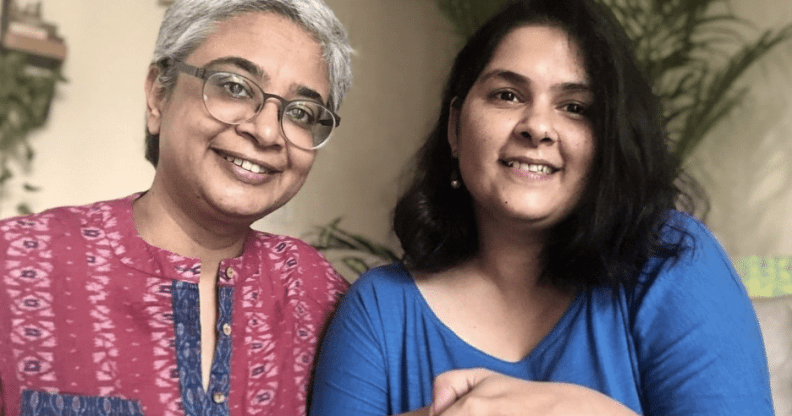Indian government argues same-sex couples don’t deserve ‘fundamental right’ to marriage

Kavita Arora and Ankita Khanna, who have been together for eight years, are spearheading the legal battle for equal marriage in India. (Twitter/Ankitakhanna)
The Indian government has told the Delhi High Court it believes same-sex couples “cannot claim a fundamental right for same-sex marriage”.
Despite decriminalising same-sex relationships in 2018, the Indian government believes that same-sex couples do not deserve the same rights as “traditional”, heterosexual couples.
“Living together as partners and having a sexual relationship by same-sex individuals is not comparable with Indian family unit concept of a husband, wife and children which necessarily presuppose a biological man as ‘husband’, a biological woman as ‘wife’ and children born out of the union,” the government said.
The Delhi High Court is considering a series of petitions that seek to end the ban on same-sex marriage. The petitions target three laws: the Hindu Marriage Act (HMA), Special Marriage Act (SMA)and Foreign Marriage Act (FMA).
Spearheading one of petitions are two queer women: Kavita Arora and Ankita Khanna.
Both mental health practitioners, the couple were refused the right to wed by the government under the SMA, which allows Indian citizens to register a marriage.
The second case, concerning the FMA, was filed by a US-based couple. Vaibhav Jain and Parag Mehta petitioned the High Court after they were refused an application for registration of their marriage by the Indian consulate in New York.
Both couples told The Independent that the uncertainty caused by the COVID-19 pandemic had underline the need for them to seek legal protections.
“The need to nominate one’s partner in health and life insurance, to protect the right to inheritance and to ensure access to the shared household, financial and other resources has never been more pressing than during the pandemic,” Arora and Khanna state in their petition.
Four equal rights activists are behind the petition challenging the HMA. They argue that the act, which governs Hindu marriage, doesn’t specify any gender. It states “marriage can indeed be solemnised between “any two Hindus’.”
The Indian government is arguing that the legal recognition of same-sex marriage is a matter to be decided by the legislature, and is not a case for the courts.
The Delhi court has previously said it may be time to “shed our inhibitions” on the issue. It was the same Delhi court that in 2009 decriminalised same-sex relationships – only for that decision to be overturned by India’s Supreme Court in 2013.
The Supreme Court could similarly overturn the decision of the Delhi court in this case. But the road to appeal would be open, as it was previously, with the Supreme Court then decriminalising same-sex relationships in 2018.
India’s laws against homosexuality are a hangover of the British colonial era, which imposed laws against “carnal intercourse against the order of nature” in 1861. Prior to being colonised by the British, same-sex relationships and gender fluidity feature prominently in ancient Indian texts and sculptures.

